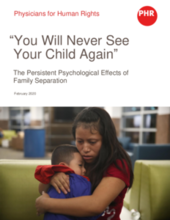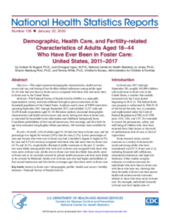This page contains documents and other resources related to children's care in the Americas. Browse resources by region, country, or category.
Displaying 421 - 430 of 1438
This report from Physicians for Human Rights (PHR) presents findings from an investigation based on psychological evaluations of asylum-seeking parents and children who were separated by the U.S. government in 2018. The investigation found pervasive symptoms and behaviors consistent with trauma, particularly the trauma of family separation.
This study used wave 2 of the U.S. National Survey of Child and Adolescent Well-Being II (NSCAW II) to develop a new typology of kinship care based on financial mechanisms, including: (1) families that received Temporary Assistance for Needy Families (TANF) only; (2) families that received foster care payments only; (3) families that received both TANF benefits and foster care payments; and (4) families that received no payments.
This article provides recommendations for adapting the pediatric medical home (PMH) model for health care needs of youth in foster care.
This paper examines the implications of recent developments in U.S. intercountry adoption (ICA) policy for vulnerable children.
This article provides a historical context and describes numerous provisions of the family group conference that protect participants and the proceedings. It then describes applications of FGC‐like approaches in the United States where practice models and policies—not laws—guide the implementation of such approaches.
The current study provides a more nuanced account of foster youth with disabilities’ transitions into adulthood.
This study used variations in the adoption and refund status of state-level Earned Income Tax Credit (EITC), a socioeconomic policy intended to reduce poverty, to examine their effect on foster care entry rates in the U.S.
In this paper, the authors examined if high socio-economic status (SES) of families had an effect on youth’s adjustment by comparing 226 internationally adopted female Chinese youth who experienced pre-adoption institutionalization with 1059 non-adopted Chinese peers living in China, as well as 209 non-adopted American peers.
This report presents demographic characteristics, health service access and use, and timing of key fertility-related milestones among adults aged 18–44 who had ever been in foster care as compared with those who had never been in foster care in the United States.
This study examined how foster parents worked together to parent foster children, how they described their roles and involvement with their foster children, how fostering impacted their coparenting and couple relationship, and their experiences and needs of working together with and within the foster care system.



